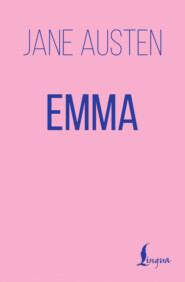По всем вопросам обращайтесь на: info@litportal.ru
(©) 2003-2025.
✖
Sense and Sensibility / Чувство и чувствительность. Уровень 3
Настройки чтения
Размер шрифта
Высота строк
Поля
“Oh, yes; and I dare say the Colonel will leave her all his fortune.”
Chapter XIV
The sudden termination of Colonel Brandon’s visit filled the mind and raised the wonder of Mrs. Jennings for two or three days. She wondered what could be the reason of it.
“Something very melancholy must be the matter, I am sure,” said she. “I saw it in his face. Poor man! I am afraid his circumstances may be bad. I will give anything to know the truth. Perhaps it is about Miss Williams and, I dare say it is, because he looked so conscious when I mentioned her. May be she is ill in town. Or may be his sister is ill at Avignon. Who knows.”
So wondered, so talked Mrs. Jennings. Her opinion varied. Elinor, though she felt really interested in the welfare of Colonel Brandon, did not pay much attention. She was more interested in the extraordinary silence of her sister and Willoughby. As this silence continued, every day made it appear more strange. Why they did not openly acknowledge to her mother and herself, what their behaviour meant, Elinor could not imagine.
She can easily conceive that marriage will not take place tomorrow; for though Willoughby is independent, there is no reason to believe him rich.
Nothing could be more expressive of attachment to them all, than Willoughby’s behaviour. The cottage was considered and loved by him as his home; many hours were spent there.
One evening, about a week after Colonel Brandon left, Mrs. Dashwood mentioned her design of improving the cottage in the spring. He warmly opposed every alteration of the place.
“What!” he exclaimed – “Improve this dear cottage! No. Never! Not a stone must be added to its walls, not an inch to its size!”
“Do not be alarmed,” said Miss Dashwood, “nothing of the kind will be done. My mother will never have money enough to attempt it.”
“I am glad of it,” he cried. “May she always be poor, if she can employ her riches no better.”
“Thank you, Willoughby. But are you really so attached to this place?”
“I am,” said he. “To me it is faultless. I consider it as the only form of building in which happiness is attainable.”
“With dark narrow stairs and a kitchen that smokes, I suppose,” said Elinor.
“Yes,” cried he in the same eager tone, “with all and everything belonging to it. Under such a roof, I may perhaps be happy.”
Mrs. Dashwood looked with pleasure at Marianne.
“Mrs. Dashwood,” added he, “do you really want to spoil this house? You want to rob it of its simplicity by imaginary improvement! This dear parlour in which our acquaintance first began, and in which so many happy hours have been since spent by us together!”
Mrs. Dashwood assured him that no alteration of the kind would be attempted.
“You are a good woman,” he warmly replied. “Your promise makes me easy.”
“Shall we see you tomorrow to dinner?” said Mrs. Dashwood, when he was leaving them. “I do not ask you to come in the morning, for we must walk to the park, to visit Lady Middleton.”
He promised to come by four o’clock.
Chapter XV
Mrs. Dashwood’s visit to Lady Middleton took place the next day, and two of her daughters went with her. Marianne remained at home.
On their return from the park they found Willoughby’s curricle. When they entered the passage, Marianne came hastily out of the parlour, with her handkerchief at her eyes; and ran upstairs. Surprised and alarmed they proceeded directly into the room, where they found only Willoughby, who was leaning against the mantelpiece.
“Is anything the matter with her?” cried Mrs. Dashwood as she entered, “is she ill?”
“I hope not,” he replied, trying to look cheerful; and with a forced smile presently added, “It is I who may be ill – for I am now suffering under a very heavy disappointment!”
“Disappointment?”
“Yes. Mrs. Smith has sent me on business to London. I have just received my dispatches, and taken my farewell of Allenham. I am here now to take my farewell of you.”
“To London! – and are you going this morning?”
“Almost this moment.”
“This is very unfortunate. But Mrs. Smith’s business will not detain you from us long I hope.”
He coloured as he replied,
“You are very kind, but I have no idea of returning into Devonshire immediately. My visits to Mrs. Smith are never repeated within the year.”
“And is Mrs. Smith your only friend? Is Allenham the only house in the neighbourhood to which you will be welcome? Oh Willoughby, do you wait for an invitation here?”
He only replied,
“You are too good.”
Mrs. Dashwood looked at Elinor with surprise. Elinor felt equal amazement. For a few moments everyone was silent. Mrs. Dashwood first spoke,
“I have only to add, my dear Willoughby, that at Barton cottage you will always be welcome. I will not press you to return here immediately, because you only can judge.”
“My engagements at present,” replied Willoughby, confusedly, “are of such a nature – that – I dare not flatter myself – ”
He stopped. Mrs. Dashwood was too much astonished to speak, and another pause succeeded. This was broken by Willoughby, who said with a faint smile,
“It is folly to linger in this manner. I will not torment myself any longer by remaining among friends whose society it is impossible for me now to enjoy.”
He then hastily left the room. He stepped into his carriage, and in a minute it was out of sight.
Elinor’s uneasiness was equal to her mother’s. She thought of what had just passed with anxiety and distrust. Willoughby’s behaviour, his embarrassment, and, above all, his unwillingness to accept her mother’s invitation, greatly disturbed her. Maybe some unfortunate quarrel had taken place between him and her sister. But Marianne loved him much, and a quarrel seemed almost impossible.
In about half an hour her mother returned, her eyes were red.
“Our dear Willoughby is now some miles from Barton, Elinor,” said she, as she sat down to work.
“It is all very strange. So suddenly! Last night he was with us so happy, so cheerful, so affectionate. And now… Something very important happened. He did not speak, he did not behave like himself. You saw the difference as well as I. What can it be? Can they quarrel? Why didn’t he accept your invitation?”
“Elinor, I have explained everything to myself in the most satisfactory way. I am persuaded that Mrs. Smith suspects his regard for Marianne, disapproves of it. Perhaps because she has other views for him, This is what happened. He is aware that she disapproves the connection, he dares not therefore at present confess to her his engagement with Marianne, and he feels himself obliged to absent himself from Devonshire for a while. And now, Elinor, what have you to say?”
“Nothing, for you have anticipated my answer.”
“Oh, Elinor, how incomprehensible are your feelings! Do you suspect him of anything?”
“I can hardly tell. But suspicion of something unpleasant is the inevitable consequence of his behaviour. Willoughby can undoubtedly have very sufficient reasons for his conduct, and I hope that he has.”
Chapter XIV
The sudden termination of Colonel Brandon’s visit filled the mind and raised the wonder of Mrs. Jennings for two or three days. She wondered what could be the reason of it.
“Something very melancholy must be the matter, I am sure,” said she. “I saw it in his face. Poor man! I am afraid his circumstances may be bad. I will give anything to know the truth. Perhaps it is about Miss Williams and, I dare say it is, because he looked so conscious when I mentioned her. May be she is ill in town. Or may be his sister is ill at Avignon. Who knows.”
So wondered, so talked Mrs. Jennings. Her opinion varied. Elinor, though she felt really interested in the welfare of Colonel Brandon, did not pay much attention. She was more interested in the extraordinary silence of her sister and Willoughby. As this silence continued, every day made it appear more strange. Why they did not openly acknowledge to her mother and herself, what their behaviour meant, Elinor could not imagine.
She can easily conceive that marriage will not take place tomorrow; for though Willoughby is independent, there is no reason to believe him rich.
Nothing could be more expressive of attachment to them all, than Willoughby’s behaviour. The cottage was considered and loved by him as his home; many hours were spent there.
One evening, about a week after Colonel Brandon left, Mrs. Dashwood mentioned her design of improving the cottage in the spring. He warmly opposed every alteration of the place.
“What!” he exclaimed – “Improve this dear cottage! No. Never! Not a stone must be added to its walls, not an inch to its size!”
“Do not be alarmed,” said Miss Dashwood, “nothing of the kind will be done. My mother will never have money enough to attempt it.”
“I am glad of it,” he cried. “May she always be poor, if she can employ her riches no better.”
“Thank you, Willoughby. But are you really so attached to this place?”
“I am,” said he. “To me it is faultless. I consider it as the only form of building in which happiness is attainable.”
“With dark narrow stairs and a kitchen that smokes, I suppose,” said Elinor.
“Yes,” cried he in the same eager tone, “with all and everything belonging to it. Under such a roof, I may perhaps be happy.”
Mrs. Dashwood looked with pleasure at Marianne.
“Mrs. Dashwood,” added he, “do you really want to spoil this house? You want to rob it of its simplicity by imaginary improvement! This dear parlour in which our acquaintance first began, and in which so many happy hours have been since spent by us together!”
Mrs. Dashwood assured him that no alteration of the kind would be attempted.
“You are a good woman,” he warmly replied. “Your promise makes me easy.”
“Shall we see you tomorrow to dinner?” said Mrs. Dashwood, when he was leaving them. “I do not ask you to come in the morning, for we must walk to the park, to visit Lady Middleton.”
He promised to come by four o’clock.
Chapter XV
Mrs. Dashwood’s visit to Lady Middleton took place the next day, and two of her daughters went with her. Marianne remained at home.
On their return from the park they found Willoughby’s curricle. When they entered the passage, Marianne came hastily out of the parlour, with her handkerchief at her eyes; and ran upstairs. Surprised and alarmed they proceeded directly into the room, where they found only Willoughby, who was leaning against the mantelpiece.
“Is anything the matter with her?” cried Mrs. Dashwood as she entered, “is she ill?”
“I hope not,” he replied, trying to look cheerful; and with a forced smile presently added, “It is I who may be ill – for I am now suffering under a very heavy disappointment!”
“Disappointment?”
“Yes. Mrs. Smith has sent me on business to London. I have just received my dispatches, and taken my farewell of Allenham. I am here now to take my farewell of you.”
“To London! – and are you going this morning?”
“Almost this moment.”
“This is very unfortunate. But Mrs. Smith’s business will not detain you from us long I hope.”
He coloured as he replied,
“You are very kind, but I have no idea of returning into Devonshire immediately. My visits to Mrs. Smith are never repeated within the year.”
“And is Mrs. Smith your only friend? Is Allenham the only house in the neighbourhood to which you will be welcome? Oh Willoughby, do you wait for an invitation here?”
He only replied,
“You are too good.”
Mrs. Dashwood looked at Elinor with surprise. Elinor felt equal amazement. For a few moments everyone was silent. Mrs. Dashwood first spoke,
“I have only to add, my dear Willoughby, that at Barton cottage you will always be welcome. I will not press you to return here immediately, because you only can judge.”
“My engagements at present,” replied Willoughby, confusedly, “are of such a nature – that – I dare not flatter myself – ”
He stopped. Mrs. Dashwood was too much astonished to speak, and another pause succeeded. This was broken by Willoughby, who said with a faint smile,
“It is folly to linger in this manner. I will not torment myself any longer by remaining among friends whose society it is impossible for me now to enjoy.”
He then hastily left the room. He stepped into his carriage, and in a minute it was out of sight.
Elinor’s uneasiness was equal to her mother’s. She thought of what had just passed with anxiety and distrust. Willoughby’s behaviour, his embarrassment, and, above all, his unwillingness to accept her mother’s invitation, greatly disturbed her. Maybe some unfortunate quarrel had taken place between him and her sister. But Marianne loved him much, and a quarrel seemed almost impossible.
In about half an hour her mother returned, her eyes were red.
“Our dear Willoughby is now some miles from Barton, Elinor,” said she, as she sat down to work.
“It is all very strange. So suddenly! Last night he was with us so happy, so cheerful, so affectionate. And now… Something very important happened. He did not speak, he did not behave like himself. You saw the difference as well as I. What can it be? Can they quarrel? Why didn’t he accept your invitation?”
“Elinor, I have explained everything to myself in the most satisfactory way. I am persuaded that Mrs. Smith suspects his regard for Marianne, disapproves of it. Perhaps because she has other views for him, This is what happened. He is aware that she disapproves the connection, he dares not therefore at present confess to her his engagement with Marianne, and he feels himself obliged to absent himself from Devonshire for a while. And now, Elinor, what have you to say?”
“Nothing, for you have anticipated my answer.”
“Oh, Elinor, how incomprehensible are your feelings! Do you suspect him of anything?”
“I can hardly tell. But suspicion of something unpleasant is the inevitable consequence of his behaviour. Willoughby can undoubtedly have very sufficient reasons for his conduct, and I hope that he has.”

















